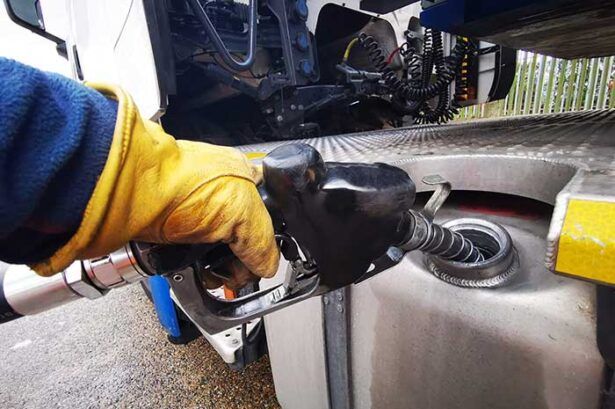
In the world of fleet management, efficiency is key. Every mile, every gallon and every transaction can impact your company’s bottom line. This means virtually every decision a fleet manager makes can increase cash flow or cost the business more money — and sound business decisions are always based on good information.
While fleet cards are a convenient way for drivers to pay for fuel and maintenance, they can help you get more out of your fleet. As a payment method, they help consolidate fuel spending and help you save on fuel with discounts or rebates. However, as a business tool, fleet fuel cards can provide valuable data and insights, helping fleet managers optimize fleet operations.
Fleet cards are ideal for fuel expense management. They offer control over purchasing, automate fuel expense tracking, and can be a powerful accounting tool when used appropriately.
Putting your business fuel card or fleet card to good use can help with:
- Expense management
- Security
- Reporting and trend analysis
- Fuel optimization
- Maintenance
Before we get into the details of how a fleet card can provide you with insights to better manage fleets, let’s make sure we understand how a fleet card captures data and where that data is stored.
What is Fleet Card Data?
When a driver purchases fuel or pays for services at a gas station or maintenance shop, all the transaction details are recorded in a fleet card dashboard. The data is tracked in real time. Common fleet card data points include:
- The cost of fuel
- Date and time of purchase
- Volume of fuel
- Mileage readings
- Fuel type and grade
All these pieces of info and more are tracked for every driver and every vehicle, giving you powerful insights into the functioning of your fleet.
Using Fleet Cards to Help with Expense Management
Fleet cards are ideal for fuel expense management. They offer control over purchasing, automate fuel expense tracking, and can be a powerful accounting tool when used appropriately.
Fuel Purchase Controls
When a company uses a fleet card, fleet managers have remarkable control over fuel purchases. Fleet fuel cards are equipped with purchase controls that allow fleet managers and business owners to set spending limits for drivers. With this level of control, you can control how much is spent and where it’s spent.
With purchase controls activated on a fuel card, fleet managers can set limits for things like:
- Fuel type and grade
- Fuel volume amount
- Purchase amount
- Purchase locations
- Days of the week
- Time of day
This level of control helps you monitor spending while preventing misuse and unauthorized expenditures. Purchase controls also help direct your drivers towards more cost-effective refueling stations and help them practice good spending habits.
Setting spending limits streamlines much of a company’s fleet spending, and managers can set alerts based on those limits. With immediate insight into questionable charges, fleet managers can act quickly to help protect the business and uninterrupted operations.
Automating Fuel Expense Tracking with Fleet Cards
As previously mentioned, all fleet card transactions are captured as they happen. With real-time data collection, fleet managers and business owners always have immediate access to their purchase data, and it’s more likely to be accurate because there is no risk of human error during the recording process. This alone is a great feature of a fleet card, especially when you consider their reporting capabilities, which we will discuss later.
However, one of the most powerful aspects of a fuel card is that data is captured and then recorded in your fleet card dashboard. For every purchase, you know:
- Which driver made the purchase
- What vehicle the purchase was for
- Dollar amount
- Volume in gallons
- Odometer readings
- Product (grade and type of fuel)
- Date and time of purchase
When drivers use a fleet card, all the data typically included in a fuel expense report is automatically collected. This means a fuel card automates fuel expense tracking and reporting.
After every purchase, you have all the insights into your drivers’ spending and your vehicles’ fuel consumption. There is no need for your drivers to collect receipts or submit fuel expense reports. And no need for your accounting department to review those reports for errors.
All the work is done for you simply by using your fleet card.
Fleet Cards are Powerful Accounting Tools

Just the fact that a fleet card provides automated fuel expense reporting is a big win for your accounting department. However, the accounting advantage goes well beyond expense reports.
Most business fuel card dashboards seamlessly communicate with most bookkeeping and accounting programs. All the information housed in your fleet card dashboard can be quickly and easily sent to your preferred bookkeeping software.
With a fleet card, your accounting department always has access to accurate and up-to-date info. This means they can spend more time focused on budgets, forecasts and growing your business because they have all the insights they need.
Security – Protection Against Fraud and Misuse
Secure transactions are a concern for every business. You want to ensure your funds are safe and protect yourself against theft and fraud. Fortunately, fleet cards can help with this. In addition to purchase controls and alerts, these payment options are more secure than credit cards and safer than cash.
When you assign a card to a driver, they receive a Personal Identification Number (PIN). This PIN is an extra layer of security designed to protect your drivers and your business. Any time an employee buys gas or diesel, they must enter their PIN at the pump. A fuel purchase can only be made if the driver enters the PIN or shares it with someone.
Using purchase controls in conjunction with PINs helps limit the chance of misuse or fraud, and when a card is lost or stolen, you can easily cancel the card and order a new one.
Reporting — Leveraging Fleet Card Insights for Better Fleet Management
We mentioned earlier that fleet cards include reporting tools. When you put this feature to good use, fleet managers can glean all kinds of insights to help get more out of your fleet. Most fleet card dashboards are equipped with the ability to run several standard reports, including but not limited to:
- Transaction detail report – shows transactions by driver or vehicle.
- Activity report – shows card authorizations and completed transactions during a specified time frame.
- Transactions by vehicle – shows transaction details for each vehicle.
- Transactions by driver – shows transaction details by driver.
In addition to the standard reporting features of a fuel car, fleet managers can create customized reports based on specific data points of interest and custom time frames.
Each report includes analytics that help shed light on the information. Using these insights, a business owner can analyze trends and better plan for the future.
Trend Analysis
One of the most significant benefits of leveraging fleet card data is gaining access to detailed trend analysis and analytics. By carefully examining fuel consumption patterns and spending behavior, businesses can identify recurring trends shedding light on how, when and where fuel is being consumed across their fleets, as well as any inefficiencies. These insights can create a more accurate fuel budget and help with route optimization.
- Businesses can identify hotspots for fuel consumption, enabling them to develop optimized routing strategies to minimize unnecessary mileage and reduce fuel usage.
- Understanding the spending behavior associated with fuel purchases allows companies to cultivate loyalty programs or negotiate volume discounts with preferred suppliers.
Predictive Analysis
Using trend analysis to address existing concerns is fundamental to effective fleet management. However, you can do a lot more with the data than address current problems. By analyzing historical data related to fuel consumption and maintenance patterns, you can predict future needs and optimize resource allocation.
Historical data can help forecast fuel consumption based on seasonal trends or specific operational conditions. This allows for proactive adjustments in purchasing and consumption strategies.
When you use predictive analysis regarding maintenance trends, you can anticipate maintenance needs and identify potential issues before they escalate.
Predictive analysis empowers businesses to make strategic decisions that drive operational efficiency and substantial cost savings.
Optimize Your Fleet’s Fuel Efficiency
One of the primary advantages of fleet card insights is their ability to enhance fuel efficiency. By analyzing fuel consumption data provided by fleet cards, managers can identify trends, outliers and inefficiencies. This allows for targeted interventions such as optimizing routes, addressing vehicle idling issues and promoting fuel-efficient driving habits among drivers.
Data from fleet cards can be integrated with GPS tracking and telematics to identify the most fuel-efficient routes and reduce unnecessary vehicle use.
One of the primary advantages of fleet card insights is their ability to enhance fuel efficiency.
Maintenance Cost Management
Regular maintenance is crucial for the longevity and efficiency of fleet vehicles. Fleet cards are an excellent tool for helping with maintenance scheduling. Rather than using generic maintenance schedules, fleet managers and business owners can schedule vehicle maintenance based on actual vehicle usage.
Vehicles that are maintained based on usage data vs. arbitrary time frames tend to perform better, last longer and require lower maintenance costs. You’re saving money and increasing cash flow by reducing fleet expenses and ensuring better vehicle performance.
Access Fleet Card Insights from Anywhere
Most fleet fuel cards include a mobile app that helps drivers find good deals on gas or diesel or find in-network fueling stations. Yet these apps offer a host of benefits to fleet managers. Virtually every data point we have discussed is available via fleet card mobile apps. You can even run and view reports from your smartphone.
All your fleet card insights are available in the palm of your hand, giving you the power to manage your fleet from anywhere there is internet access.
Put Your Fleet Card to Good Use
Fleet cards are treasure troves of data. When used effectively, they can transform fleet management. From efficient fuel expense management and enhanced security features to powerful reporting and analytics, fleet cards truly are business solutions for fleet management and we can help you find one that fits your company’s needs.